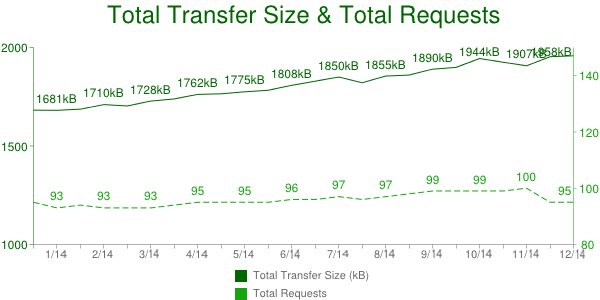Subject: Responsive Webpage Design
According to statistics gathered by the HTTP Archive the results shown in the below graph show the average web page grew in size 14.6%; about 2 megabytes in the past year. In previous years, 2013, and 2012, the rate at which the ‘average’ webpage grew annually, were at rates of 30%, and 32% respectively.

What were the factors associated with the increases in average size? CSS (Cascading Style Sheets), a typical portion of web page source code, grew 23% in size compared to 2013’s average webpage. Also the amount of and size of images used on the average webpage also expanded by 20%. Javascript was more prevalent too with a 7% increase, but the use of Adobe Flash in web pages decreased around 4%.
Although at home internet surfers are experiencing a richer page viewing experience, this is also a drawback for those surfing on portable devices that rely on slow cell phone network data connections. A solution would be to design mobile-friendly-pages perhaps utilizing a mobile sitebuilder ; and using a javascript function to decide if a regular sized webpage or a more compact mobile version should be sent/downloaded to your website visitor.
read_more
Currently only a small percentage of web pages download fast and are not annoying to load/view on mobile devices. Responsive design will probably be a more pressing issue in 2015 as the average webpage size continues to grow while more website browsing is done on smartphones and tablets. If you need tips on responsive design for your website, just write us at support@. You or your webpage developer should design for increased page loading speed, but we would be glad to help you with suggestions too.
The average web page PageSpeed score was reported at 78 for 2014, which is surprising given the extra bloat each year. Slower page loading has remained most obvious on mobile device connections.
So why create and publish a badly-optimized websites? There are solutions to page bloat or weight.
We believe our clients have an incentive to make their presentation effectively with small, fast-loading web pages. This is because people are using cell phones and tablets to access webpages more and more. A clunky or hard to view site-load on a tablet or cell phone can incite the visitor to click the back button so they can choose an easier-to-view competitor from the search listings.
If you need just tips or possibly some website size optimization re-work, just let us know, again, anytime at
support@(thishostingcompanydomainname).com .












